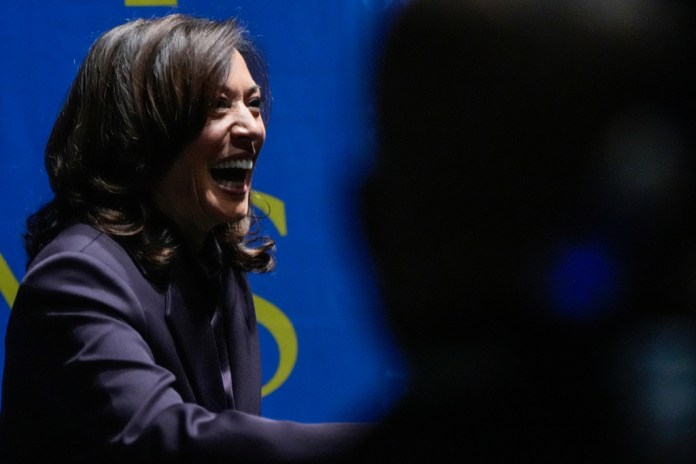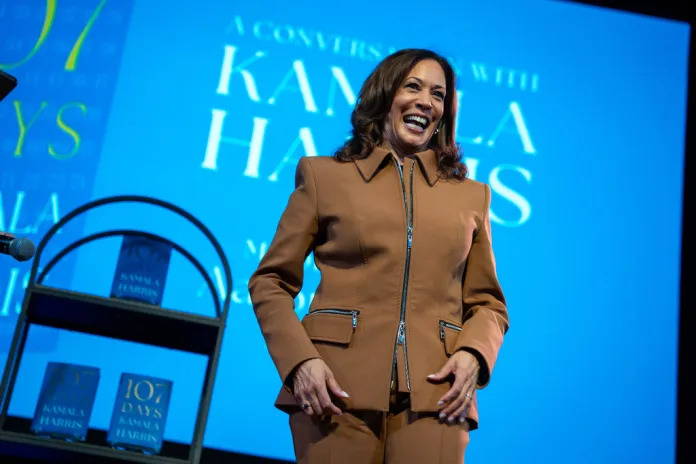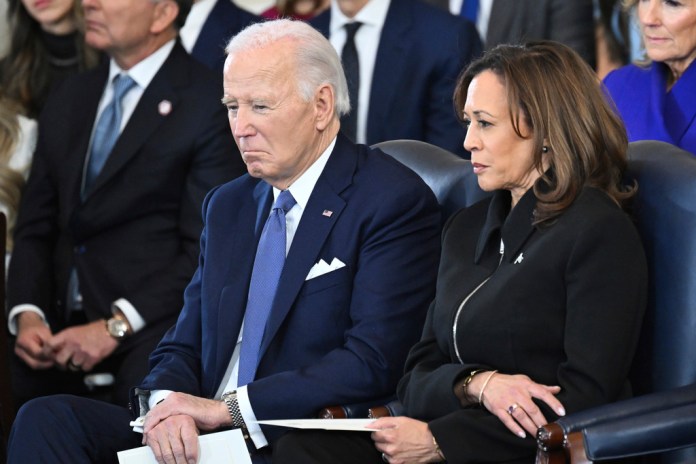Wake up with the Washington Examiner: Biden’s Supreme Court plan, defining Harris, and the FBI’s cryptic problem – Washington Examiner
Is-project-2025-and-why-are-people-so-afraid-of-it” target=”_blank” title>What is Project 2025 and why are people so afraid of it?
Project 2025 is often referred to in discussions surrounding political or governmental reforms, though specifics can vary depending on the context in which it is mentioned. Generally, it suggests a comprehensive plan aimed at enacting significant changes by the year 2025, often tied to a particular political agenda or ideology.
People may have fears or concerns about Project 2025 for several reasons:
1. **Political Ideology**: If the project aligns with a specific political ideology that is controversial or divisive, individuals opposing that ideology may fear the implications of its implementation.
2. **Policy Changes**: The project may propose significant alterations to existing laws, regulations, or governmental structures, leading people to worry about potential negative consequences, such as erosion of rights or freedoms.
3. **Lack of Transparency**: If the details of the project are not well-publicized or understood, it can lead to speculation and anxiety regarding what exactly will happen.
4. **Historical Context**: Sometimes, projects or initiatives evoke fear because they are reminiscent of past policies or decisions that had harmful outcomes.
5. **Manipulation or Misinformation**: Misinformation or deliberate manipulation of facts surrounding the project can exacerbate fears and lead to greater public concern.
Without additional context, it’s hard to pinpoint exactly what aspects of Project 2025 are causing fear, as reactions vary widely by individual perspectives, political affiliations, and the specifics of the proposal.
Wake up with the Washington Examiner: Biden’s Supreme Court plan, defining Harris, and the FBI’s cryptic problem
Biden’s Supreme Court plan
President Joe Biden is making good on early promises he would move to “reform” the Supreme Court. He let down his base early on when his Presidential Commission on the Supreme Court of the United States didn’t result in calling for massive overhauls to the institution. Democrats have been agitating for ethics codes, term limits, and an expanded bench for years.
It’s not likely any of the president’s demands for change on the high court are going to come to fruition, but in the final days of his time in office, Biden has laid out precisely what he wants to happen with the high court.
Breaking News Reporter Jack Birle took a look at the president’s proposal released in an op-ed for the Washington Post early Monday morning.
The gist of the reforms, Jack wrote, comes down to three major ideas that have been percolating for years and one that has been in the political bloodstream for only a few weeks.
“Biden argued for his points of reforming the high court and reversing a recent decision made by the court in an opinion piece in the Washington Post,” Jack wrote. “The president, who served in the Senate from 1973 to 2009, argued for term limits, a reformed Supreme Court ethics code, and wiping away immunity for the president for any acts.”
While most of the ideas aren’t new — presidents have been subject to term limits for decades — Biden and Democrats are particularly concerned about the court’s recent decision that offers broad immunity for presidents who are carrying out “official acts” while in office. The question came before the court in response to former President Donald Trump’s actions on Jan. 6, 2021.
The Washington Examiner has argued the court struck an appropriate balance of protection and oversight for presidents with the decision.
“With lawfare now a routine means of weakening political opponents, the court’s 6-3 majority in Trump v. United States struck the right balance, extending the immunity presidents already enjoy in the civil context, which all nine justices support, to the criminal context,” we wrote shortly after the decision.
However, the court’s decision has caused delays in all of Trump’s trials and angered Democrats to no end.
“What is happening now is not normal, and it undermines the public’s confidence in the court’s decisions, including those impacting personal freedoms,” Biden wrote on Monday. “We now stand in a breach.”
To counter the court, Biden is suggesting a constitutional amendment titled the “No One Is Above the Law Amendment” that would “make clear that there is no immunity for crimes a former president committed while in office.”
Constitutional amendments are incredibly difficult to execute, and given the requirement of two-thirds of both chambers of Congress and ratification by three-fourths of the states to pass, it’s unlikely Biden’s plan will go anywhere.
Click here to read about Biden’s last attempt to fight the Supreme Court before he retires.
‘Kamala the cop’ loses its luster
Vice President Kamala Harris is in a historic position. She has been vaulted to the top of her party and is days away from cementing her position as the Democratic nominee for president with fewer than 100 days before final votes are cast. For all the excitement her swap with Biden at the top of the ticket has elicited, those short 16 weeks leave her with a massive problem.
Harris will, of course, be hitting the trail trying to introduce and define herself to voters who only have vague memories of her 2019 campaign. Vice presidents tend to fade into the background of the public consciousness, and besides her occasional blips early on for bungling her border assignment or the odd “word salad” response that would go viral for the very online to mock, Harris is unknown at the national level.
This week, the Washington Examiner is taking a look at the various ways Harris is going to try to define herself and how Republicans are going to take those arguments from the former prosecutor and spin them back on her.
This morning, Senior Investigations Reporter Barnini Chakraborty took a look at Harris’s record as a prosecutor and her role as the “top cop” in California before running for Senate. Harris’s history as a prosecutor spelled trouble for her in 2019 as the Left’s rage and frustration with police officers and law enforcement hit a high water mark. She tried to run on her tough-on-crime record that angered Democrats and raised Republicans’ eyebrows.
“Harris’s opinions and actions, at times, have put her at odds with both sides of the political spectrum. To those on the Right, she wasn’t tough enough,” Barnini wrote. “To those on the Left, she was too tough and didn’t do her job speaking up for marginalized communities. She’s also been accused of being a social and political climber, fixated on getting power rather than getting the job done.”
With “defund the police” fading into distant memory, Harris is reprising her prosecutorial record as a defining selling point for why she is best suited to defeat former President Donald Trump in November.
“I took on perpetrators of all kinds, predators who abused women, fraudsters who ripped off consumers, cheaters who broke the rules for their own game,” Harris said at a Wisconsin rally and has made a regular item in her stump speech. “So hear me when I say I know Donald Trump’s type.”
Democrats’ focus on Trump’s litany of legal struggles leaves Harris in what should be a prime position. The former president won’t be spending his time in courtrooms this fall, as his various trials have been delayed in light of the Supreme Court’s sweeping decision about presidential immunity being adjudicated. But Harris can give her supporters, and Trump’s biggest critics, the trials they have waited for.
The only problem, as Barnini pointed out this morning, is Harris’s record is shot through with landmines.
Early on in her time as the San Francisco district attorney, Harris angered everyone when she declined to seek the death penalty for a gang member who shot and killed a police officer. The murder angered then-California Sens. Dianne Feinstein and Barbara Boxer.
Despite the outrage by members of her own party, Harris refused to relent on her position, insisting the death penalty discriminated against poor, black, and minority defendants.
Barnini ran through a lengthy list of problems Harris will have to address in the coming weeks. However, given her time in public office, if not in the public eye, some Democrats are saying she has already weathered the worst of the storm. If her problems as a prosecutor haven’t kept her from rising to be the first female vice president in U.S. history, Republicans might need to find another way to define her.
Click here to read all about Harris’s struggle to reclaim her ‘good cop’ image.
Cryptic calls from the FBI
The FBI might have the force and authority of the U.S. government behind it, but investigators are still struggling to access key information from the phone recovered from the man who shot Trump two weeks ago.
During a hearing before Congress last week, FBI Director Christopher Wray said his agency had accessed the shooter’s phone but was locked out of some messages and apps that could reveal the motive for the assassination attempt.
“In terms of our ability to access it, we have been able to get into and exploit a number of electronic devices, digital devices, but not all of them yet, and then within his various accounts, we’ve been able to get access to some of them, but some of them we’re still waiting on,” Wray said. “Some of them we may never get access to because of the encryption issue that presents an increasingly vexing barrier for law enforcement.”
Those struggles, Justice Reporter Ashley Oliver wrote this morning, are due to encryption and privacy measures tech companies take to ensure their customers that some data they don’t want shared with anyone can stay private.
Apps such as Signal, WhatsApp, and Proton Mail offer users end-to-end encryption protection that locks messages from unauthorized users. Only the sender and receiver can see the messages, and the FBI is still catching up to the technology.
Short of breaking through the privacy firewalls themselves, the FBI and other agencies have tried to go down legal roads that would force companies to provide them with information or create backdoors in the products that would allow alternative ways in. Companies have fought subpoenas and other legal demands while outright refusing to create intentionally weak products that can be accessed by unauthorized users.
Given the roadblocks, privacy lobbyists and activists are concerned the FBI is preparing to go all the way to the president to seek help.
“Given the FBI’s long history of working to undermine end-to-end encryption, it’s very likely they will ask the next president to help them do it, and we can already see Director Wray laying that groundwork,” Hajar Hammado, a senior policy adviser at Demand Progress, told Ashley.
Even with the president on board, it’s not clear the FBI is going to have any success in undermining encryption protocols. Members of Congress are aware of the problems encryption can cause investigators in instances, such as investigating an attempted assassination of a former president, but appear skeptical about gutting privacy programs for everyone in other instances.
Click here to read more about the encryption versus FBI showdown playing out.
GOP — Private eyes
There has been a lot about the investigation into the attempted assassination of Trump that Republican lawmakers have not been satisfied with. While privacy and encryption troubles have slowed things, there is more information, and answers, senators and representatives think need clarifying.
The peak point of frustration might have been the bipartisan grilling of former Secret Service Director Kimberly Cheatle last week. Nine days after the shooting in Butler, Pennsylvania, Cheatle appeared before the House Oversight Committee to answer questions about the tragic event that left one man dead and two others injured, plus the former president shot.
Cheatle was grilled by everyone on the committee. Rep. Nancy Mace (R-SC) asked Cheatle if she’d like to form her resignation letter then and there — something the director declined at the time but handed over a day later.
After failing to provide the committee with answers to basic questions, GOP lawmakers took it upon themselves to go on a fact-finding mission, Senate Reporter Ramsey Touchberry wrote for us this morning.
“Armed with accusations that federal investigators aren’t being transparent, lawmakers have obtained and unveiled new footage and details of security pitfalls that may have enabled a rooftop shooter to strike Trump from only a few hundred feet away,” Ramsey wrote.
Lawmaker investigations have included public records requests and in-the-field walkthroughs of the shooting site.
Sen. Chuck Grassley (R-IA) railed against the FBI, which is leading the investigation, after he used his congressional authority to obtain video footage of the shooting and released it to reporters.
“Federal agencies ought to be embarrassed that Chuck Grassley has beaten them to the investigative punch,” Grassley told Ramsey. “My oversight won’t be letting up anytime soon.”
Another group wasn’t content to send off letters from Washington. House Homeland Security Committee Chairman Mark Green (R-TN) took a group of lawmakers to the shooting site in Pennsylvania last week, and they walked through the grounds and climbed on top of the “sloped roof” where the shooter sat and Cheatle said was unable to be secured.
It’s not clear what other information lawmakers are trying to pry out of local and federal officials. Cheatle has resigned from her post, and lawmakers are pushing to ensure the next director of the agency will have to be approved by them. Biden announced there is an independent investigation into the Secret Service to determine what went wrong that led to the political violence that has lain mostly dormant for more than 30 years.
Click here to read more about lawmakers’ forays into investigative work.
New from us
Bring the national defense bill to the Senate floor
Kamala Harris expected to expand Biden’s child gender transition agenda if elected
Five conspiracy theories that have gained traction in aftermath of Trump assassination attempt
Fear over Project 2025 created ‘out of thin air,’ editor argues
What goes into picking a vice president
In case you missed it
Biden’s ‘border czar’ doesn’t want to change anything
JD Vance is cleaning up his kitty litter mess
How Kamala is expected to break the mold of the Biden-Harris administration
For your radar
Biden will travel to Austin, Texas, to commemorate the 60th anniversary of the Civil Rights Act at the LBJ Presidential Library at 4:30 p.m. The president is expected to lay out his plan to overhaul the Supreme Court.
Biden will travel to Houston to pay respects to the late Rep. Sheila Jackson Lee at 8:30 p.m.
" Conservative News Daily does not always share or support the views and opinions expressed here; they are just those of the writer."




